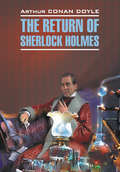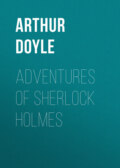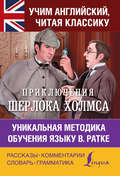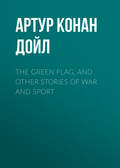полная версия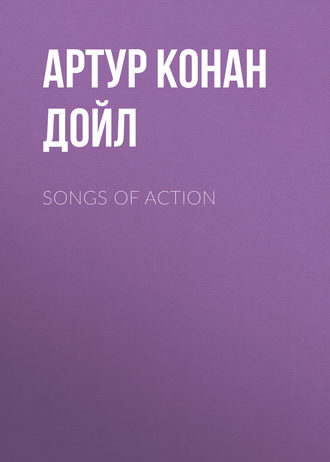

Артур Конан Дойл
Songs of Action
A ROVER CHANTY
A trader sailed from Stepney town —
Wake her up! Shake her up! Try her with the mainsail!
A trader sailed from Stepney town
With a keg full of gold and a velvet gown:
Ho, the bully rover Jack,
Waiting with his yard aback
Out upon the Lowland sea!
The trader he had a daughter fair —
Wake her up! Shake her up! Try her with the foresail
The trader he had a daughter fair,
She had gold in her ears, and gold in her hair:
All for bully rover Jack,
Waiting with his yard aback,
Out upon the Lowland sea!
‘Alas the day, oh daughter mine!’ —
Shake her up! Wake her up! Try her with the topsail!
‘Alas the day, oh daughter mine!
Yon red, red flag is a fearsome sign!’
Ho, the bully rover Jack,
Reaching on the weather tack,
Out upon the Lowland sea!
‘A fearsome flag!’ the maiden cried —
Wake her up! Shake her up! Try her with the jibsail!
‘A fearsome flag!’ the maiden cried,
But comelier men I never have spied!’
Ho, the bully rover Jack,
Reaching on the weather tack,
Out upon the Lowland sea!
There’s a wooden path that the rovers know —
Wake her up! Shake her up! Try her with the headsails!
There’s a wooden path that the rovers know,
Where none come back, though many must go:
Ho, the bully rover Jack,
Lying with his yard aback,
Out upon the Lowland sea!
Where is the trader of Stepney town? —
Wake her up! Shake her up! Every stick a-bending!
Where is the trader of Stepney town?
There’s gold on the capstan, and blood on the gown:
Ho for bully rover Jack,
Waiting with his yard aback,
Out upon the Lowland sea!
Where is the maiden who knelt at his side? —
Wake her up! Shake her up! Every stitch a-drawing!
Where is the maiden who knelt at his side?
We gowned her in scarlet, and chose her our bride:
Ho, the bully rover Jack,
Reaching on the weather tack,
Right across the Lowland sea!
So it’s up and its over to Stornoway Bay,
Pack it on! Crack it on! Try her with the stunsails!
It’s off on a bowline to Stornoway Bay,
Where the liquor is good and the lasses are gay:
Waiting for their bully Jack,
Watching for him sailing back,
Right across the Lowland sea.
A BALLAD OF THE RANKS
Who carries the gun?
A lad from over the Tweed.
Then let him go, for well we know
He comes of a soldier breed.
So drink together to rock and heather,
Out where the red deer run,
And stand aside for Scotland’s pride —
The man that carries the gun!
For the Colonel rides before,
The Major’s on the flank,
The Captains and the Adjutant
Are in the foremost rank.
But when it’s ‘Action front!’
And fighting’s to be done,
Come one, come all, you stand or fall
By the man who holds the gun.
Who carries the gun?
A lad from a Yorkshire dale.
Then let him go, for well we know
The heart that never will fail.
Here’s to the fire of Lancashire,
And here’s to her soldier son!
For the hard-bit north has sent him forth —
The lad that carries the gun.
Who carries the gun?
A lad from a Midland shire.
Then let him go, for well we know
He comes of an English sire.
Here’s a glass to a Midland lass,
And each can choose the one,
But east and west we claim the best
For the man that carries the gun.
Who carries the gun?
A lad from the hills of Wales.
Then let him go, for well we know,
That Taffy is hard as nails.
There are several ll’s in the place where he dwells,
And of w’s more than one,
With a ‘Llan’ and a ‘pen,’ but it breeds good men,
And it’s they who carry the gun.
Who carries the gun?
A lad from the windy west.
Then let him go, for well we know
That he is one of the best.
There’s Bristol rough, and Gloucester tough,
And Devon yields to none.
Or you may get in Somerset
Your lad to carry the gun.
Who carries the gun?
A lad from London town.
Then let him go, for well we know
The stuff that never backs down.
He has learned to joke at the powder smoke,
For he is the fog-smoke’s son,
And his heart is light and his pluck is right —
The man who carries the gun.
Who carries the gun?
A lad from the Emerald Isle.
Then let him go, for well we know,
We’ve tried him many a while.
We’ve tried him east, we’ve tried him west,
We’ve tried him sea and land,
But the man to beat old Erin’s best
Has never yet been planned.
Who carries the gun?
It’s you, and you, and you;
So let us go, and we won’t say no
If they give us a job to do.
Here we stand with a cross-linked hand,
Comrades every one;
So one last cup, and drink it up
To the man who carries the gun!
For the Colonel rides before,
The Major’s on the flank,
The Captains and the Adjutant
Are in the foremost rank.
And when it’s ‘Action front!’
And there’s fighting to be done,
Come one, come all, you stand or fall
By the man who holds the gun.
A LAY OF THE LINKS
It’s up and away from our work to-day,
For the breeze sweeps over the down;
And it’s hey for a game where the gorse blossoms flame,
And the bracken is bronzing to brown.
With the turf ’neath our tread and the blue overhead,
And the song of the lark in the whin;
There’s the flag and the green, with the bunkers between —
Now will you be over or in?
The doctor may come, and we’ll teach him to know
A tee where no tannin can lurk;
The soldier may come, and we’ll promise to show
Some hazards a soldier may shirk;
The statesman may joke, as he tops every stroke,
That at last he is high in his aims;
And the clubman will stand with a club in his hand
That is worth every club in St. James’.
The palm and the leather come rarely together,
Gripping the driver’s haft,
And it’s good to feel the jar of the steel
And the spring of the hickory shaft.
Why trouble or seek for the praise of a clique?
A cleek here is common to all;
And the lie that might sting is a very small thing
When compared with the lie of the ball.
Come youth and come age, from the study or stage,
From Bar or from Bench – high and low!
A green you must use as a cure for the blues —
You drive them away as you go.
We’re outward bound on a long, long round,
And it’s time to be up and away:
If worry and sorrow come back with the morrow,
At least we’ll be happy to-day.
THE DYING WHIP
It came from gettin’ ’eated, that was ’ow the thing begun,
And ’ackin’ back to kennels from a ninety-minute run;
‘I guess I’ve copped brownchitis,’ says I to brother Jack,
An’ then afore I knowed it I was down upon my back.
At night there came a sweatin’ as left me deadly weak,
And my throat was sort of tickly an’ it ’urt me for to speak;
An’ then there came an ’ackin’ cough as wouldn’t leave alone,
An’ then afore I knowed it I was only skin and bone
I never was a ’eavy weight. I scaled at seven four,
An’ rode at eight, or maybe at just a trifle more;
And now I’ll stake my davy I wouldn’t scale at five,
And I’d ’old my own at catch-weights with the skinniest jock alive.
And the doctor says the reason why I sit an’ cough an wheeze
Is all along o’ varmint, like the cheese-mites in the cheese;
The smallest kind o’ varmint, but varmint all the same,
Microscopes or somethin’ – I forget the varmints’ name.
But I knows as I’m a goner. They never said as much,
But I reads the people’s faces, and I knows as I am such;
Well, there’s ’Urst to mind the ’orses and the ’ounds can look to Jack,
Though ’e never was a patch on me in ’andlin’ of a pack.
You’ll maybe think I’m boastin’, but you’ll find they all agree
That there’s not a whip in Surrey as can ’andle ’ounds like me;
For I knew ’em all from puppies, and I’d tell ’em without fail —
If I seed a tail a-waggin’, I could tell who wagged the tail.
And voices – why, Lor’ love you, it’s more than I can ’elp,
It just comes kind of natural to know each whine an’ yelp;
You might take them twenty couple where you will and let ’em run,
An’ I’d listen by the coverside and name ’em one by one.
I say it’s kind of natural, for since I was a brat
I never cared for readin’ books, or fancy things like that;
But give me ’ounds and ’orses an’ I was quite content,
An’ I loved to ear ’em talkin’ and to wonder what they meant.
And when the ’ydrophoby came five year ago next May,
When Nailer was be’avin’ in a most owdacious way,
I fixed ’im so’s ’e couldn’t bite, my ’ands on neck an’ back,
An’ I ’eaved ’im from the kennels, and they say I saved the pack.
An’ when the Master ’eard of it, ’e up an’ says, says ’e,
‘If that chap were a soldier man, they’d give ’im the V.C.’
Which is some kind a’ medal what they give to soldier men;
An’ Master said if I were such I would ’a’ got it then.
Parson brought ’is Bible and come to read to me;
‘’Ave what you like, there’s everythink within this Book,’ says ’e.
Says I, ‘They’ve left the ’orses out!’ Says ’e, ‘You are mistook;’
An’ ’e up an’ read a ’eap of things about them from the Book.
And some of it amazin’ fine; although I’m fit to swear
No ’orse would ever say ‘Ah, ah!’ same as they said it there.
Per’aps it was an ’Ebrew ’orse the chap ’ad in his mind,
But I never ’eard an English ’orse say nothin’ of the kind.
Parson is a good ’un. I’ve known ’im from a lad;
’Twas me as taught ’im ridin’, an’ ’e rides uncommon bad;
And he says – But ’ark an’ listen! There’s an ’orn! I ’eard it blow;
Pull the blind from off the winder! Prop me up, and ’old me so.
They’re drawin’ the black ’anger, just aside the Squire’s grounds.
’Ark and listen! ’Ark and listen! There’s the yappin’ of the ’ounds:
There’s Fanny and Beltinker, and I ’ear old Boxer call;
You see I wasn’t boastin’ when I said I knew ’em all.
Let me sit an’ ’old the bedrail! Now I see ’em as they pass:
There’s Squire upon the Midland mare, a good ’un on the grass;
But this is closish country, and you wants a clever ’orse
When ’alf the time you’re in the woods an’ ’alf among the gorse.
’Ark to Jack a’ollering – a-bleatin’ like a lamb.
You wouldn’t think it now, perhaps, to see the thing I am;
But there was a time the ladies used to linger at the meet
Just to ’ear me callin’ in the woods: my callin’ was so sweet.
I see the crossroads corner, with the field awaitin’ there,
There’s Purcell on ’is piebald ’orse, an’ Doctor on the mare,
And the Master on ’is iron grey; she isn’t much to look,
But I seed ’er do clean twenty foot across the ’eathly brook.
There’s Captain Kane an’ McIntyre an’ ’alf a dozen more,
And two or three are ’untin’ whom I never seed afore;
Likely-lookin’ chaps they be, well groomed and ’orsed and dressed —
I wish they could ’a seen the pack when it was at its best.
It’s a check, and they are drawin’ down the coppice for a scent,
You can see as they’ve been runnin’, for the ’orses they are spent;
I’ll lay the fox will break this way, downwind as sure as fate,
An’ if he does you’ll see the field come poundin’ through our gate.
But, Maggie, what’s that slinkin’ beside the cover? – See!
Now it’s in the clover field, and goin’ fast an’ free,
It’s ’im, and they don’t see ’im. It’s ’im! ’Alloo! ’Alloo!
My broken wind won’t run to it – I’ll leave the job to you.
There now I ’ear the music, and I know they’re on his track;
Oh, watch ’em, Maggie, watch ’em! Ain’t they just a lovely pack!
I’ve nursed ’em through distemper, an’ I’ve trained an’ broke ’em in,
An’ my ’eart it just goes out to them as if they was my kin.
Well, all things ’as an endin’, as I’ve ’eard the parson say,
The ’orse is cast, an’ the ’ound is past, an’ the ’unter ’as ’is day;
But my day was yesterday, so lay me down again.
You can draw the curtain, Maggie, right across the winder pane.




